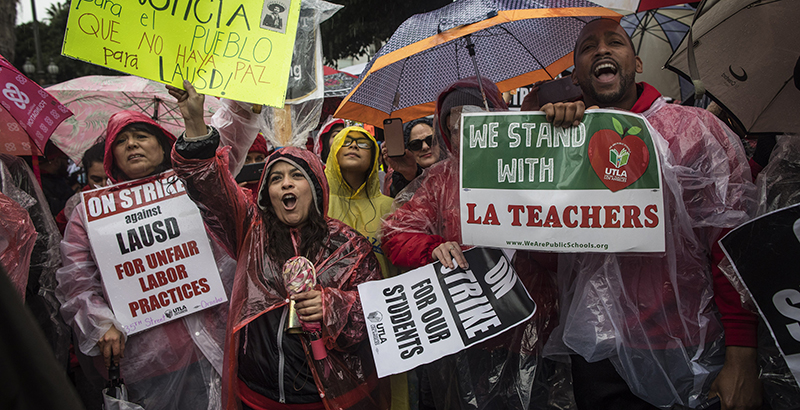Johnson: Teachers Who Are Going Out on Strike Need More Than Money or Smaller Classes. They Need Dignity

Since West Virginia teachers left their classrooms a year ago, teacher strikes have fanned out across the nation. There have been eight more strikes — in Los Angeles last month and again today in West Virginia. Oakland teachers will be on their way out later this week.
So why are teachers striking? At first glance, it seems like the issues are money and working conditions. Los Angeles teachers, for instance, returned to work after securing a 6 percent pay increase and reductions in class size.
But something more is at stake. Too many teachers feel robbed of professional agency. In schools and districts across the country, many educators feel they are not treated as professionals with a clear, well-respected voice on issues that pertain to their daily work, like instructional materials or how they develop their practice over time.
Educator resentment has been simmering for a while, and too often stagnant salaries and inadequate benefits only fan the flames of deeper discontent. “The feeling of disdain and disrespect from the community and decision-makers at large was so defeating,” Mandy Flora, a former fifth-grade teacher in Huntington, West Virginia, and a fellow at Teaching Lab, recently told me.
Flora took part in the West Virginia walkout last year because she wanted to send a message. “The strike was about feeling involved in decision-making and buy-in,” she said. “The money was just the last straw. We knew if we didn’t resolve these issues, lots of great teachers would leave.”
In fact, policy changes big and small have been happening to teachers instead of with them for decades. In many cases, when educators have had little or no say in reforms, the initiatives didn’t stick. For example, about a decade ago many districts and states started adopting new teacher evaluation systems without enough teacher buy-in. Although those new systems came with some benefits, today, even after large resource investments, many of them are no longer in place. This may be because decision-makers did not spend enough time mobilizing teachers to understand or defend the new systems. Without sufficient teacher empowerment, it was easy for teachers to feel like they were evaluated unfairly and that evaluation results were irrelevant to their ongoing development.
Similarly, at the district and school levels, without teacher buy-in, new and crucial reforms like improved instructional materials are not going to succeed. But when educators are treated with dignity and get the respect they deserve, when they are included in the discussion and understand the why, and when they are empowered and paid to lead, student learning increases.
The professional relationships among educators — their social capital — is another underleveraged resource for building teacher empowerment. Fostering strong educator relationships increases the chance that changes will be sustained, and when empowered educators collaborate to solve pressing problems of teaching and learning, students benefit.
The recent teacher strikes have made clear the value of educator relationships and empowerment. Whether or not the teachers’ demands were met, the strikes themselves created a sense of cohesion and renewed pride. This communal sense of power can be used to dramatically improve teaching and learning, or it can be used to shut down a whole system.
Teachers are the most important resource we have to prepare students for the future. When we ignore their input, we not only deprive ourselves of essential guidance that help policy and instructional shifts succeed, but we also undermine their agency in the classroom.
Paying teachers more and improving working conditions is a great first step. But we need to follow these reforms with deeper structural changes. The strikes send an important signal: If we don’t listen to teachers and build their agency and leadership when decision-makers implement policy and programmatic changes, any improvement — no matter how promising or evidence-based — will fail.
Sarah Johnson is the chief executive officer of Teaching Lab, a teacher professional learning organization serving teachers in several cities across the country.
Get stories like these delivered straight to your inbox. Sign up for The 74 Newsletter

;)